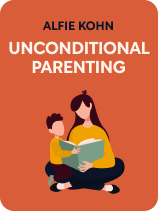

This article is an excerpt from the Shortform book guide to "Unconditional Parenting" by Alfie Kohn. Shortform has the world's best summaries and analyses of books you should be reading.
Like this article? Sign up for a free trial here .
What are the principles of modern-day parenting? Why are they potentially harmful? What are the alternatives to modern-day parenting?
Alfie Kohn wrote his parenting book, Unconditional Parenting, to show readers the pitfalls of modern-day parenting. According to Kohn, modern-day parenting relies on a conditional system of rewards and punishment, which, while convenient, can damage children’s well-being in the long run.
Keep reading to find out what’s wrong with modern-day parenting and what Kohn suggests as an alternative.
Modern-Day Parenting: What Do Kids Need From Parents?
How can we raise kids to be self-confident, independent, and compassionate?
In this article, we’ll highlight Kohn’s alternative to modern-day parenting and add a few more techniques to try out. Find out what kids really need from their parents, why using rewards and punishments doesn’t work (and can even backfire) in the long term, and what you can do to make your kids feel loved and valued for who they are rather than what they do.
Problems With Modern-Day Parenting
Kohn argues that the system of modern-day parenting, which focuses on rewards and punishments (and their close relatives, bribes, and threats), is ultimately destined to fail both parent and child. Specifically, parents should stop using these techniques for six reasons:
1. Modern-day parenting is rooted in behaviorism, an outdated psychological theory that’s inappropriate to use with human children. Kohn traces conditional parenting techniques (including the time-out) back to the work of 1950s behaviorists, most of whom experimented on pigeons, rats, and chimpanzees.
2. They send children the wrong message. Conditional parenting techniques teach children that:
- You only love them when they behave well.
- Compliance is more important than independent thinking.
- Their parents’ approval is more important than their own desires.
3. They make children self-interested. Rewards, punishments, threats, and bribes make kids selfish because these techniques cause them to focus on the consequences to themselves rather than on the consequences to others.
4. They’re manipulative and disrespectful. Rewards and punishments are designed to control children. They trivialize kids’ own desires and points of view in a way that you’d never consider doing with another adult.
5. They don’t work. Rewards, punishments, bribes, and threats might “work” to achieve compliance in the short term, but in the long term they’re ineffective and often backfire. In fact, children whose parents don’t offer rewards and punishments are more likely to comply when their parents do ask them to do something. This effect even seems to kick in instantly—in one study, 3- and 4-year-old children whose mothers were told not to control their play during a short play session were more likely to comply with their mothers’ instructions immediately afterward. And even if a technique does elicit compliance in the short term, Kohn encourages you to question whether the short-term win is worth the damage you might have done to the relationship.
6. They have damaging long-term effects. Kohn cites studies showing that children whose parents use “control techniques” end up with poor self-esteem and depression and may even be more likely to commit crimes.
Alternative to Modern-Day Parenting: Being Unconditional
To replace ineffective and damaging modern-day parenting tactics, Kohn proposes “unconditional parenting.” This means making it absolutely clear to your child that your love doesn’t depend on their compliance.
Unconditional parenting has these advantages:
1. Prioritizes the relationship over the behavior
2. Prioritizes long-term goals over short-term ones
3. Prioritizes the child’s developmental needs over the adult’s convenience
4. Sees the child as an active, rather than a passive, participant
Kohn notes that unconditional parenting is much more demanding than falling back on rewards and punishments. Modern-day parents who want to move toward unconditional parenting have to be patient, self-aware, and scrupulously honest with themselves and their kids. They also have to battle the tendency to pass conditional parenting from generation to generation.
(Shortform note: Though conditional parenting does seem in part to be generational, there’s also evidence that parenting in many societies is becoming more sensitive and affectionate across the board. This could partly be due to increasing education levels, which seem to be associated with a more sensitive approach.)

———End of Preview———
Like what you just read? Read the rest of the world's best book summary and analysis of Alfie Kohn's "Unconditional Parenting" at Shortform .
Here's what you'll find in our full Unconditional Parenting summary :
- How to raise kids to be self-confident, independent, and compassionate
- Why you should throw away the standard parenting rulebook
- Why rewards and punishments cause more harm than good






